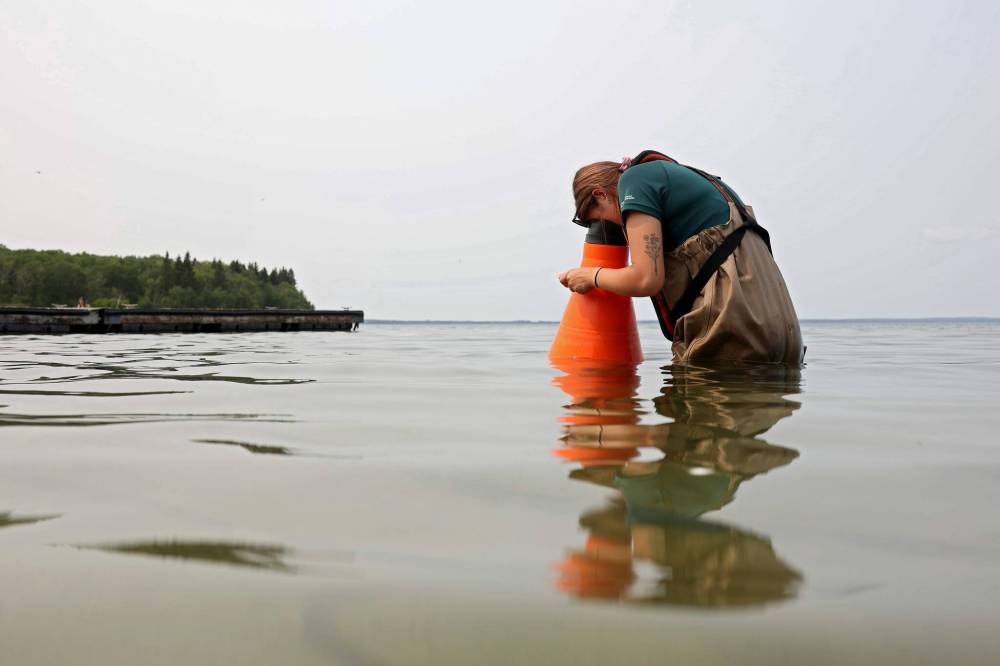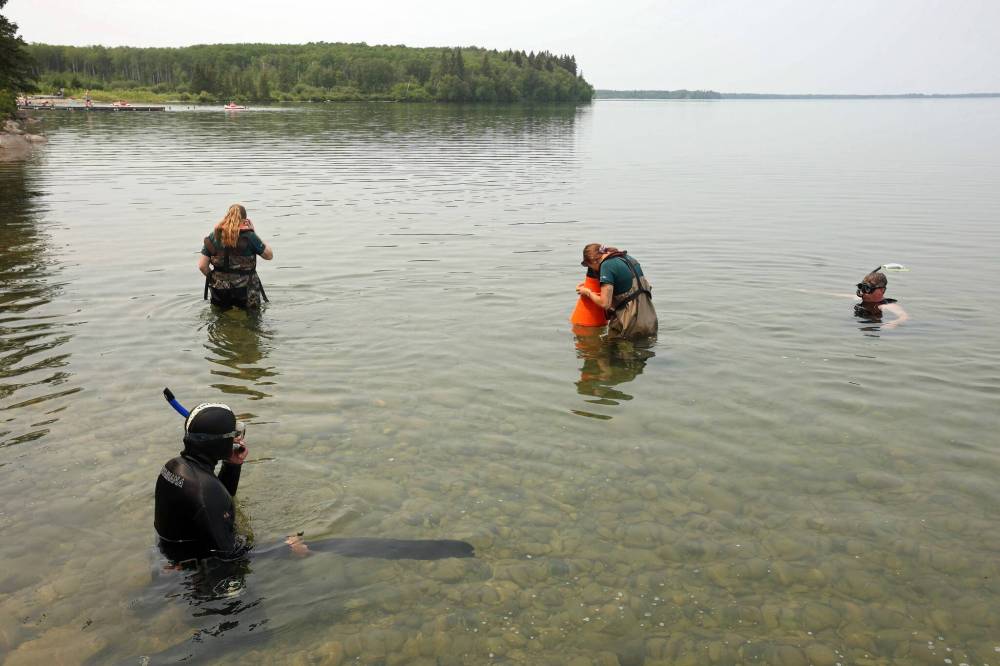Evidence of zebra mussel infestation discovered at Clear Lake Parks staff believe infestation limited to one cove, taking steps to contain it
Read this article for free:
or
Already have an account? Log in here »
To continue reading, please subscribe:
Monthly Digital Subscription
$0 for the first 4 weeks*
- Enjoy unlimited reading on winnipegfreepress.com
- Read the E-Edition, our digital replica newspaper
- Access News Break, our award-winning app
- Play interactive puzzles
*No charge for 4 weeks then price increases to the regular rate of $19.95 plus GST every four weeks. Offer available to new and qualified returning subscribers only. Cancel any time.
Monthly Digital Subscription
$4.99/week*
- Enjoy unlimited reading on winnipegfreepress.com
- Read the E-Edition, our digital replica newspaper
- Access News Break, our award-winning app
- Play interactive puzzles
*Billed as $19.95 plus GST every four weeks. Cancel any time.
To continue reading, please subscribe:
Add Free Press access to your Brandon Sun subscription for only an additional
$1 for the first 4 weeks*
*Your next subscription payment will increase by $1.00 and you will be charged $16.99 plus GST for four weeks. After four weeks, your payment will increase to $23.99 plus GST every four weeks.
Read unlimited articles for free today:
or
Already have an account? Log in here »
Hey there, time traveller!
This article was published 19/07/2024 (543 days ago), so information in it may no longer be current.
There’s evidence of a “localized” zebra mussel infestation at Clear Lake’s main boat cove, Parks Canada announced Friday, adding the race is on to contain the invasive species before it spreads throughout the lake — or to the Assiniboine River.
On July 17, Parks Canada snorkellers found one live mussel and an empty shell on a rock in the high-risk boat launch area, suggesting there’s “probably a localized infestation in boat cove,” said Winnipeg Liberal MP Terry Duguid, Canada’s special adviser on water.
Water samples collected in the area between June 19 and 27 have tested positive for zebra mussel DNA.

TIM SMITH / BRANDON SUN
A Parks Canada employee conducts visual inspections for signs of zebra mussels near the Clear Lake boat cove in Riding Mountain National Park on Friday. Parks Canada announced Friday they found evidence of localized zebra mussel infiltration at the boat cove.
Parks staff believe the infestation is limited to the cove, where they found an initial clump of 48 live mussels in November. Additional tests taken throughout the lake have come back negative.
“We’re taking measures to contain the infestation,” Duguid said.
Earlier this month, Parks Canada announced it could contain a possible zebra mussel infestation by installing “curtains” from the cove to the pier.
Duguid said the semi-permeable curtains, due to arrive next week, will act “like an underwater fence,” to prevent larvae from spreading throughout the lake or into water bodies downstream, including the Little Saskatchewan and Assiniboine rivers.
Staff are also considering the use of potash — a Health Canada-approved pesticide treatment — to eradicate the mussels.
Parks Canada said the decision is “pending the results of further visual surveys and water sampling from other areas of the lake.”
“The important thing is that we seal off this portion of the lake, begin treatment options and try and prevent this infestation from spreading because this is such a special place for Manitoba, for Canadians, and very important for tourism,” Duguid said. “We want to do everything in our power to protect the ecological integrity of this place.”
Duguid said downstream municipalities and First Nations are concerned about the effect of further spread.
“It’s really important to take a preventative approach, not only for Clear Lake but for downstream communities, because we know very well the damage and harm that zebra mussels do, particularly to water infrastructure throughout the country,” he added.
“Parks is doing the right thing… addressing the issue before it gets too far out of hand.”–James Plewak
James Plewak, a former chief of Keeseekoowenin and a senior official with the Coalition of First Nations with Interests in Riding Mountain National Park, said his community was informed about the discovery earlier this week.
“My view is that I think Parks is doing the right thing,” Plewak said. “They’re addressing the issue before it gets too far out of hand, they’re erring on the side of caution.”
Local tourism operators say business has taken a hit since Parks Canada imposed a ban on all but three pre-approved watercraft in May. They’re looking for more certainty from the federal agency as to what comes next.
“Families and businesses in Clear Lake have borne an immense financial cost over the uncertainty this spring, with tourism bookings down 10 to 20 per cent in some cases,” Karly McRae, president of Lakehouse Properties in Wasagaming, said in a statement.
(The Canadian Press / The Associated Press files / US Geological Survey)
Officials are considering using potash, a Health Canada-approved pesticide treatment, to get rid of the zebra mussels.McRae said she was “disappointed to hear that zebra mussels have been found in Clear Lake though cautioned it’s too early to know what the findings mean for the lake overall.
“We encourage Parks Canada to hold public meetings and reach out and work with the community to find creative solutions that will protect downstream waterways and allow Canadians to continue to access this incredible place,” McRae said.
Ashley Smith, who opened her Indigenous-owned camping and tourism outfit, Turtle Village, last summer said her business has seen a drop in visitors and an increase in cancellations since the boat ban.
Smith stressed the lake should not be shut down in the long term. Instead, she suggests spreading “clean, drain, dry” messaging to boaters, increasing inspection stations and hiring more aquatic invasive species staff. The mussels hitch a ride on boats.
According to Duguid, tourism has been steady at Riding Mountain despite the boat ban, with year-over-year visitation numbers slightly higher this summer.
Duguid said the ban on all but three pre-approved boats, though “not a popular decision,” has likely helped minimize the impacts of an infestation.
“If we had not taken some of these measures, there would have been a wider infestation that we cannot contain,” he said.
The boat ban will remain in effect, Parks Canada said.
Though Clear Lake falls under federal jurisdiction, Manitoba’s natural resources branch has stepped up efforts to protect downstream waterways from the invasive species, Natural Resources Minister Jamie Moses said Friday.
The province recently released a strategy to manage aquatic invasive species, which Moses said goes hand in hand with the $500,000 increase to its aquatic invasive species budget.
The province also introduced a mobile inspection team this summer, which has been deployed throughout the province over the last couple of weeks. The province has 100,000 lakes that cover 16 per cent of its surface.
Moses said the mobile unit has been “very successful in educating the public and making sure the public do their part, which is to clean, drain, dry and when needed, decontaminate.”
Riding Mountain PC MLA Greg Nesbitt has called for the provincial government to test any streams leading out of Clear Lake for zebra mussels.

TIM SMITH / BRANDON SUN
Water samples collected in near Clear Lake’s main boat cove between June 19 and 27 have tested positive for zebra mussel DNA.
“All the streams that lead out of Clear Lake go into the Little Saskatchewan River and into the Assiniboine (River),” Nesbitt said Friday.
“For the past year, I’ve been calling for water testing and reporting to the public on the results of those tests. To date, I haven’t received any assurance from the minister that that’s being done.”
Moses confirmed the province will increase testing downstream.
“That’s really going to help us be able to stop the spread and take the necessary actions to keep all of our waterways as clean and as safe as possible.”
A joint federal-provincial check stop for aquatic invasive species on the Manitoba-Ontario border June 21-23 successfully searched nearly 400 vehicles towing boats. More than one-quarter of the boats failed inspection, while five were found to carry zebra mussels.
So far, two people have been charged under the National Parks Act for paddleboarding on Clear Lake during the closure, Parks Canada statement. Violating the ban carries a fine of up to $25,000.
— with files from Colin Slark
julia-simone.rutgers@freepress.mb.ca

Julia-Simone Rutgers is the Manitoba environment reporter for the Free Press and The Narwhal. She joined the Free Press in 2020, after completing a journalism degree at the University of King’s College in Halifax, and took on the environment beat in 2022. Read more about Julia-Simone.
Julia-Simone’s role is part of a partnership with The Narwhal, funded by the Winnipeg Foundation. Every piece of reporting Julia-Simone produces is reviewed by an editing team before it is posted online or published in print — part of the Free Press‘s tradition, since 1872, of producing reliable independent journalism. Read more about Free Press’s history and mandate, and learn how our newsroom operates.
Our newsroom depends on a growing audience of readers to power our journalism. If you are not a paid reader, please consider becoming a subscriber.
Our newsroom depends on its audience of readers to power our journalism. Thank you for your support.
History
Updated on Friday, July 19, 2024 11:59 AM CDT: Adds information from Parks Canada
Updated on Friday, July 19, 2024 6:24 PM CDT: Adds details, quotes, photos.











